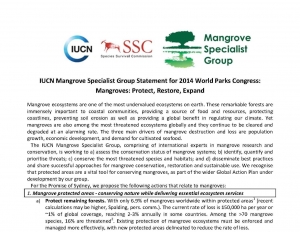World Parks Congress called to Protect, Restore and Expand Mangroves
IUCN Mangrove Specialist Group and international experts recognize Protected Areas as vital to mangrove conservation
Location: Sydney, Australia. 17th Nov 2014
The IUCN Mangrove Specialist Group, comprising of international experts in mangrove research and conservation, is working to a) assess the conservation status of mangrove systems; b) identify, quantify and prioritise threats; c) conserve the most threatened species and habitats; and d) disseminate best practices and share successful approaches for mangrove conservation, restoration and sustainable use. In the Statement, the Mangrove Specialist Group proposed concrete actions that will protect, restore and expand mangrove protected areas. These actions include using mangrove protected areas to:
-
Conserve nature while delivering essential ecosystem services. This includes protecting intact and healthy remaining forests;
-
Operate within goals of economic and community well-being. This includes promoting community-managed mangrove protected areas and implementing ecologically functional coastal greenbelts;
-
Achieve mangrove protected areas in practice. This includes using science-based restoration methods; and
-
Work towards specific mangrove targets to 2020. This includes "by 2016, the top 10 humanitarian agencies worldwide involved in disaster relief will have adopted a mangrove code of practice".
Read the full Statement,
Mangrove ecosystems are one of the most undervalued ecosystems on earth. These remarkable forests are immensely important to coastal communities, providing a source of food and resources, protecting coastlines, preventing soil erosion as well as providing a global benefit in regulating our climate. Yet mangroves are also among the most threatened ecosystems globally and they continue to be cleared and degraded at an alarming rate. The three main drivers of mangrove destruction and loss are population growth, economic development, and demand for cultivated seafood.
For more details, please visit the IUCN Mangrove Specialist Group page. For more information about the IUCN Mangrove Specialist Group, please contact:
Louise Baldwin
International Marine and Freshwater Projects Co-ordinator
IUCN SSC Mangrove Specialist Group Programme Officer
Conservation Programmes
Zoological Society of London
louise.baldwin@zsl.org

Page from IUCN Mangrove Specialist Group Statement at WPC, Sydney, Australia © ZSL, 2014